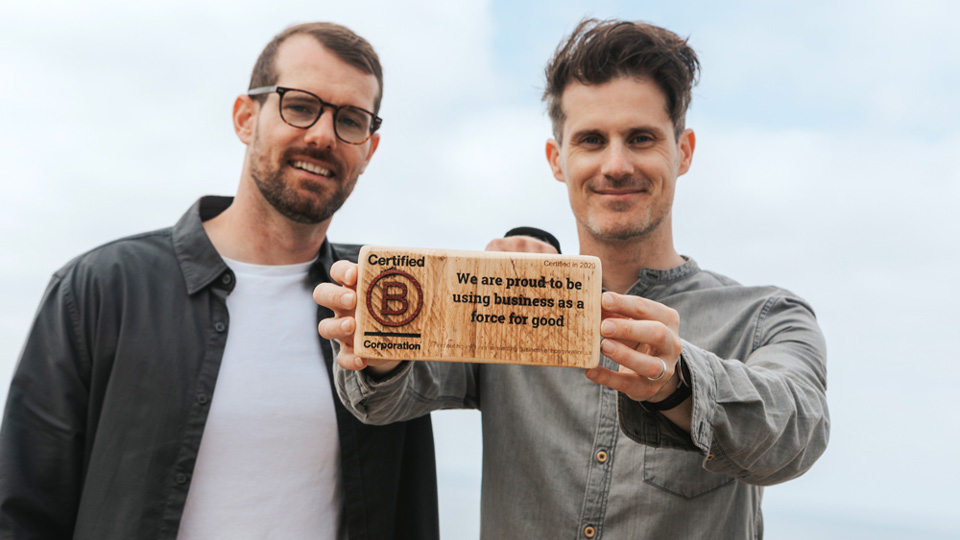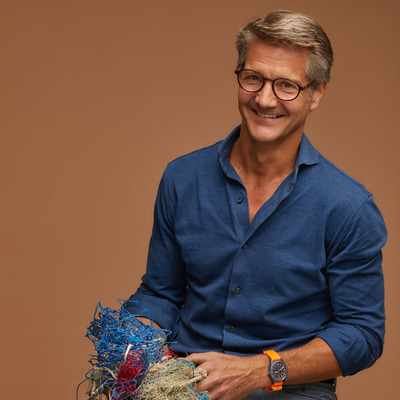- OT
- Industry
- Eyewear and lenses
- Being a B Corp in eyewear: “We’re constantly working to improve”
Being a B Corp in eyewear: “We’re constantly working to improve”
In recognition of B Corp Month, OT asked three B Corp certified eyewear companies to share the difference it makes for business, and for the sector, as well as sustainability tips for practices

27 March 2024
March marks B Corp Month, a time in which members of the B Corp movement celebrate what it means to be part of the network of businesses aiming to “benefit all people, communities, and the planet.”
Certified B Corps meet a set of standards of performance, accountability, and transparency, outlined and verified by B Lab.
To achieve certification, businesses must:
- Achieve a B Impact Assessment score of 80 or above and pass a risk review – demonstrating “high social and environmental performance” (The median score for ordinary businesses who complete the assessment is currently 50.9, B Lab suggests)
- Make a legal commitment to accountability to all stakeholders
- Exhibit transparency in making available information about their performances against the B Lab standards.
More than 8000 businesses have become B Corp certified around the world, while the UK movement is made up of more than 1700 businesses.
To understand what business looks like for this growing cohort of companies, and how it makes a difference to the optical sector, OT heard from two B Corp certified eyewear companies.
Bird Eyewear, certified since: March 2020
How does being a B Corp make a difference for Bird Eyewear?
Ed Bird (EB), founder of Bird Eyewear: At Bird Eyewear, we believe everyone has the right to see nature and be inspired by it. But we’re not just slapping a ‘green’ label on our frames and calling it a day. Being the highest scoring B Corp in the eyewear industry is a big deal to us. It shows we have gone all-in on making a positive impact, socially and environmentally, but it also means we’re an open book about our impact, ready to share the good, the bad, and the ugly. Following the routine recertification process in 2023, Bird Eyewear saw its B Impact score jump to 128.2 Read more here.

The B Corp agenda is not a one-time deal, as you’re assessed every three years, so we’re constantly working to improve our team, culture, products, and impact. It’s definitely more of a mindset that runs from the ground up.
Bird shared the reasons the eyewear company became a B Corp in this video.
Being the highest scoring B Corp in the eyewear industry is a big deal to us
What effect do you see the B Corp initiative having for the optical sector?
EB: It’s great to see the B Corp movement gaining momentum in the industry, with more brands becoming or looking to get certified. It’s an easy way for stockists to separate those that are serious about becoming a force for good vs those that have other priorities. As more and more consumers look for authentically sustainable brands, we see this trend growing over the coming years.
B Corp in numbers
8000
Certified B Corps1700
B Corps in the UK162
industries are representedSea2see, certified since: December 2021
How does being a B Corp make a difference for Sea2see?

The Sea2see brand was born to eco disrupt the optical market in 2016. Our priorities were the protection of our ocean with our Sea2see Foundation, raising awareness about the impact of marine plastic, using an upcycled raw material in the optical market for the first time. But we also wanted to give optical stores and consumers the opportunity to share our values, and proposed a new upcycled product that has a real social and environmental impact. Sea2see is vertically integrated from its impact, the source in coastal environments, to the final product in the stores.
What effect do you see the B Corp initiative having for the optical sector?B Corp is not about being the best on the planet, but rather, the best for the planet
FVDA: Like in any other sector where it is being used, it should be a stamp of credibility.
It encourages us to widen the scope of our innovation and put all our initiatives under the microscope to constantly strive for better
Eyespace Eyewear, Certified since: November 2023
How does being a B Corp make a difference for Eyespace Eyewear?
Jayne Abel (JA), CEO and co-founder of Eyespace Eyewear: B Corp certification is highly significant for us – not only ‘us’ as a business and our individual employees, but for our customers and partners – this globally-recognised accreditation builds incredible trust in our culture, products and services, strengthening our relationships internationally. It encourages us to widen the scope of our innovation and put all our initiatives under the microscope to constantly strive for better.
Our team feels a deep sense of pride, working for one of only a handful of British optical suppliers to achieve B Corp, and delight in our sustainability objectives having genuine authenticity. There’s no greater feeling than being at the forefront of a growing global movement striving for positive change, and at all levels our teams have invested in becoming more responsible, to contribute towards leaving a positive legacy for future generations.
What effect do you see the B Corp initiative having for the optical sector?
JA: As a non-profit network transforming the global economy to benefit people, communities, and the planet, B Corp sets the gold-standard of global sustainability accreditations; it’s a journey that everyone in our industry should strive towards and as a professional community. We all have a responsibility to unite in adapting and adopting more sustainable approaches, ensuring we build resilience and are future fit.
Innovating will undoubtedly deliver competitive growth, but it also delivers inclusivity, demonstrates positive leadership and, of course, will see us collectively get ahead of the curve in tackling climate change, lowering our collective carbon footprint, and improving standards throughout the full chain of supply.
Sustainability in eyewear
A core focus within the B Corp model is that of environmental performance. OT asked the contributors to share their top tip for practices engaging with sustainability in eyewear.
Ed Bird: “We’ve seen stockists introduce a 20% sustainable range, that’s become 80% of their bestsellers within six months. It’s often the stories behind the brands that carry the most impact, so we make a point of creating helpful point of sale items and story-led displays that resonate with people. Everyone has to start somewhere, and there are some great brands emerging that offer a better alternative for both customers and practices.”
François van dan Abeele: “I think it is important to check what the story of the frame is in terms of tangible impact (socially and environmentally). Selling sustainable products is important if retailers can make consumers feel that they are part of a sustainable story by wearing our product. Practices and stores can also offset their plastic usage by compensating it with credits.”
Jayne Abel: “When we are all working towards the same goal, amazing things happen. Responsible and conscious purchasing has become the standard for both retailers and consumers, and so practice owners and buyers should be holding very high expectations of their suppliers, asking the right questions and anticipating transparency and authenticity in return.
“There’s no better time to put your money with those organisations that are adopting the full breadth of ESG business practices, and certifications such as B Corp assure you that these companies are genuine in their sustainability mission. We would always encourage practice buyers to choose suppliers that are guided by the OSA’s Green Charter; it’s possibly one of, if not the, easiest way you can personally contribute to driving positive change throughout the industry.”
Advertisement


Comments (0)
You must be logged in to join the discussion. Log in